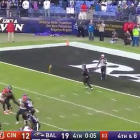Perhaps it's only fitting that the Bengals-Ravens game ended on a special teams play, even if didn't involve Justin Tucker striping 50-something-yard field goals. Instead, with the Ravens leading 19-12, facing a fourth-and-8, and the ball on their 23-yard line with 11 seconds left, punter Sam Koch took the snap and ... well, not much else. He didn't kick the ball, or try to run for a first down, or attempt a pass. He backpedaled, stopped, backpedaled some more, and after the clock struck struck zero, only then did he run out of the back of the end zone for a safety.
Oh, and in those 11 seconds, Koch's 10 Ravens teammates on the field with him held their Bengals' counterparts. Yes, those are all penalties -- and they were flagged as such -- but there's a loophole in the NFL rule book that favors the offense.
HARBAUGH RT @firstandskol Ravens win by holding Bengals intentionally & delaying safety, no time extension for flags pic.twitter.com/YWqmONk0Ll
— CJ Fogler (@cjzero) November 27, 2016
A game can't end on a defensive penalty, but it can end on an offensive penalty -- or penalties. And that's what happened here. The Ravens held, the Bengals got held, Koch wastes time, and when the clock expired, he ran out of bounds. Cincy got two points but still lost, 19-14.
If this looks familiar, it should; Koch and the Ravens did the same thing late in Super Bowl XLVII against John Harbaugh's brother, then-49ers coach Jim Harbaugh, though it wasn't quite as successful.
The Ravens tried the tackling play to take a safety to end the Super Bowl against SF, but Chris Culliver broke through and forced Koch ob.
— Jason Lisk (@JasonLisk) November 27, 2016
This is where we point out that John Harbaugh was a longtime special teams coach before he replaced Brian Billick in Baltimore in 2007. Speaking of Billick ...
Every ST Coordinator coaches #Ravens "take safety" play same way. Hold like hell, if called, do it again until clock hits 0.
— Brian Billick (@CoachBillick) November 27, 2016
Such strategies aren't risk free.
Ravens obviously lucky the right Bengal didn't emerge to chase punter on game-ending safety. If it was 55, they'd need a new punter.
— Andrew Perloff (@andrewperloff) November 27, 2016
(This assumes, of course, that Vontaze Burfict doesn't flop first.)
There's also the question of fairness, which the NFL addressed afterwards.
NFL says end of Ravens-Bengals game officiated correctly. Not a palpably unfair act to use that tactic on one play... (continued)
— MarkMaske (@MarkMaske) November 27, 2016
... (2 of 2) If Ravens had used same intentional holding tactic on a second straight play, it would have been palpably unfair act, NFL says.
— MarkMaske (@MarkMaske) November 27, 2016
















